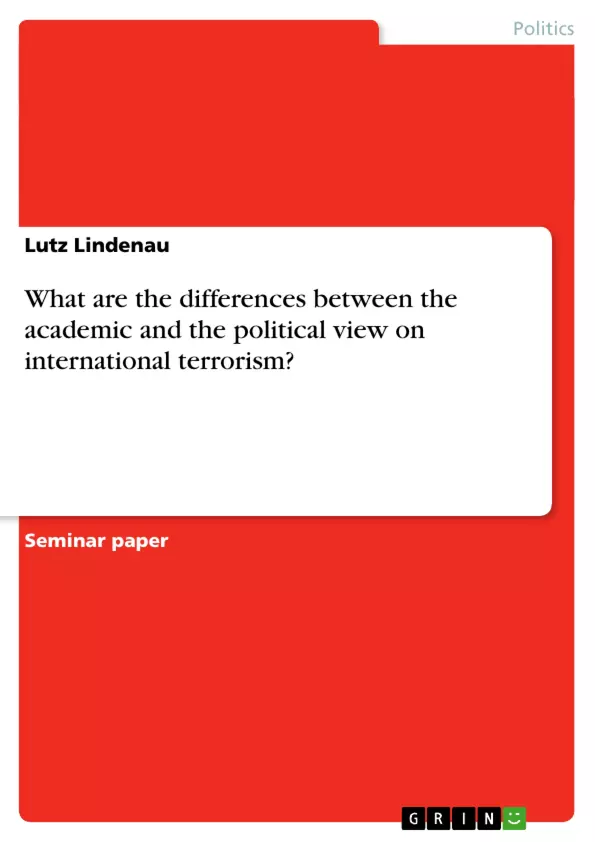As a student of political science, who participated in the course United Nations International
Student Conference of Amsterdam (UNISCA). I am supposed to write a final essay. This final
essay is expected to combine the scientific perspectives from the syllabi during the
preparation with the practical perspective that I gained in the actual conference.
In this simulation of the policy process in the United Nations (UN) I obtained the role of an
Israeli ambassador, who had to cope with the issues of international terrorism, right to selfdetermination
and the peaceful use of outer space in the 1st Committee.
Due to the events of 11th September, that might become a turning point in history, as many
believe, most of the time and negotiations in the 1st committee were devoted to the issue of
international terrorism during the conference. It therefore seems logical to me that I dedicate
my paper to this topic that struck fear in the hearts of million people in the entire western
world, confronting us with new global cleavages, alliances, and a shift toward security at the
expense of individual freedom. Though the course-material regarding international terrorism
was collected before the terrorist attack on the USA on 11th September, and certainly needs to
be updated and re-evaluated, it provides the reader with a general insight on that matter. In the
academic sphere, problems can be defined, analysed and eventually successfully solved. But
on the other hand it is the sphere of politics that mainly has to deal with problems. There are
other rules in the political realm endemic than in the scientific world. These political rules basically reflect relations of power and therefore cannot solve problems ‘easily’ like in the
academic realm. [...]
Inhaltsverzeichnis (Table of Contents)
- Introduction.
- What is the academic approach on international terrorism?.
- What is the political approach on international terrorism?
- What are the most striking differences between both views?
- Conclusion...
- Sources.
Zielsetzung und Themenschwerpunkte (Objectives and Key Themes)
The essay aims to analyze the differences between the academic and political approaches to international terrorism. This is done by examining the academic literature on terrorism, the political processes observed at the UNISCA conference, and the gap between these two perspectives.
- The definition and scope of international terrorism.
- The role of cultural cleavages and globalization in terrorism.
- The impact of political power dynamics and the policy process on combating terrorism.
- The challenges of bridging the gap between academic analysis and practical policy-making.
- The implications of recent events such as the 9/11 attacks on the understanding and response to terrorism.
Zusammenfassung der Kapitel (Chapter Summaries)
- Introduction: This section provides a brief overview of the essay's purpose and the context of the UNISCA conference. It highlights the significance of international terrorism as a contemporary issue and introduces the essay's research question.
- What is the academic approach on international terrorism?: This chapter explores various academic perspectives on terrorism. It examines different articles and lectures presented during the UNISCA course and highlights key themes such as the motivations of terrorist groups, the role of cultural factors, and the need for preventative measures.
Schlüsselwörter (Keywords)
The essay focuses on the core themes of international terrorism, academic analysis, political perspectives, cultural cleavages, globalization, policy-making, and the relationship between theory and practice.
Frequently Asked Questions
What is the academic approach to international terrorism?
The academic approach focuses on defining, analyzing, and finding theoretical solutions to the root causes of terrorism, such as cultural cleavages and globalization.
How does the political approach differ from the scientific one?
The political realm is governed by power relations and immediate security needs, making it harder to implement long-term theoretical solutions compared to the academic sphere.
What role did 9/11 play in the study of terrorism?
9/11 is seen as a turning point that shifted the global focus toward security, often at the expense of individual freedom, and created new global alliances.
What is UNISCA?
UNISCA is an international student conference in Amsterdam that simulates the policy processes of the United Nations.
Can international terrorism be solved easily?
While academics can define and analyze the problem, the political reality of power dynamics makes a simple solution extremely difficult.
- Arbeit zitieren
- Lutz Lindenau (Autor:in), 2001, What are the differences between the academic and the political view on international terrorism?, München, GRIN Verlag, https://www.grin.com/document/18767



